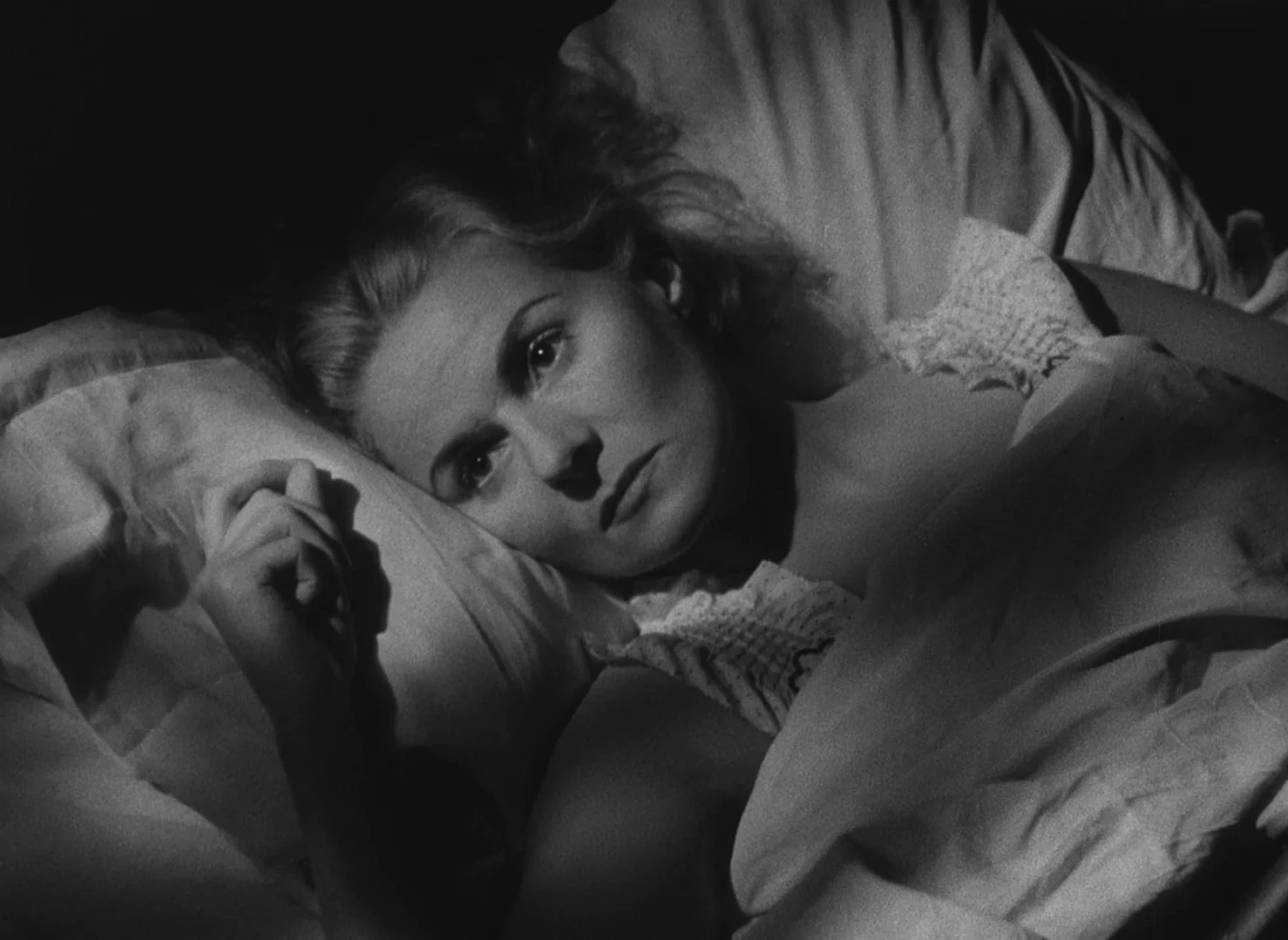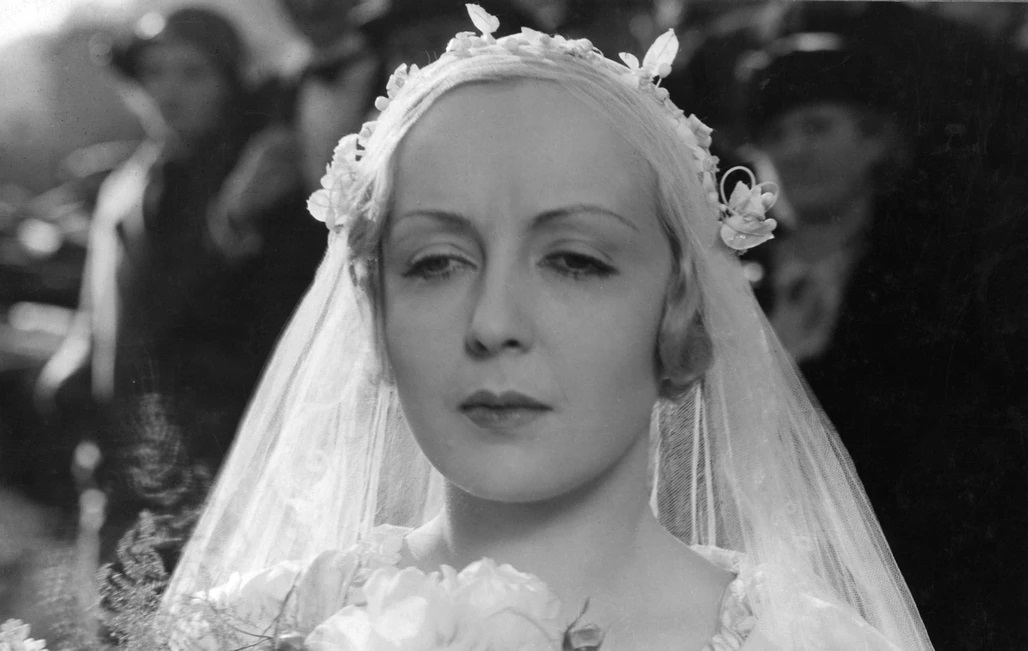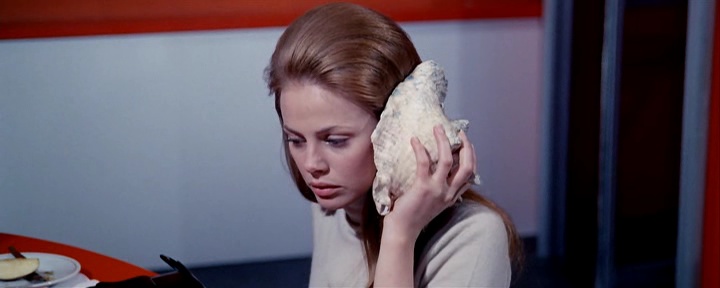
By Libertad Gills
In The Passionate Friends (David Lean, 1949), Mary (Ann Todd) is torn between two men: the boring husband (Claude Rains) and the exciting lover (Trevor Howard). She goes back and forth between them, undecided. What does she want? Lean explores cinematic ways of conveying what characters are thinking, with a special emphasis on the female protagonist. Even though she doesn’t voice it herself, the men tell her what she wants and why she cannot have it: her problem is that she “wants to belong to herself” and that’s why she cannot give herself over to romantic love. She will have a “failed life”, warns her lover, and this thought comes back to haunt her leading her to suicidal thoughts and eventually back to her husband’s secure arms. In beautiful key moments in the film, the faces of actors are silenced by an occasional wind or fog which freezes them briefly, almost to suggest that thoughts and desires are like the wind or a cloud: unpredictable, impulsive, able to change everything from one moment to the next if you let them or, if not, they simply pass. Coincidentally, Lean and Todd fell in love during the making of this film, left their spouses after its premiere, and married.
In Sentimental Value (Joachim Trier, 2025), Nora (Renate Reinsve) is a brilliant theater actress who occasionally suffers from stage fright. She is sleeping with her married coworker, but when he wants to be close to her she withdraws. When he finally separates, she realizes she wants to be with him, but it’s too late. The film suggests that her inability to express herself adequately or even understand her emotions when it comes to men stems from unresolved issues with her father (Stellan Skarsgård), a film director who prioritized his filmmaking over his family life. What does she want? Perhaps a sense of safety and security missing from her childhood that only her work provides. When she finally reads her dad’s new screenplay, she realizes he’s understood her in ways that she did not even know.
In L’Atalante (Jean Vigo, 1934), Juliette (Dita Parlo) and Jean set sail on their honeymoon immediately after their seaside wedding. Juliette begs her husband to take her to Paris but his possessive ways make him keep her on the boat, away from other men. Determined to see the latest city fashions, she goes out on her own without a word to Jean. She walks down the streets of Paris to experience two sides of the city: on one side, the fascination with the shop windows, the newest automatons and latest trends and styles, and on the other, the sense of danger of strange men and the threat of pickpockets. The illusion of the big city fades quickly. Father Jules (Michel Simón), the sailor of Jean’s boat, goes out to look for her and finds her. She returns to the boat, afraid of how her husband will react. To her surprise, he hugs her with joy, happy to have her back. She wanted to see the city and she did. She had to give that to herself even if it meant potentially losing her man.

Another woman goes missing in Dry Leaf (Alexandre Koberidze, 2025), this time a sports photographer named Lisa who leaves town without saying a word and her father goes on a search for her. The film follows her steps, arriving at rural football stadiums in Georgian villages after she has already left. The camera lingers on the landscapes, animals and people as an echo of a gaze we can never know. In her absence, Koberidze’s lores digital video camera detaches itself from a human gaze, discovering ways of seeing only accessible to a kino eye. At the end of the film, her father receives a letter from her with instructions on where to find her. She wants to be lost for a little while, but the detailed precision of these instructions indicate that she also wants to be found. The film suggests another form of communication between father and daughter is possible, one that exists not only in the form of words (or lack thereof, as in Sentimental Value), but also in a way of looking at the world.
In I cannibali (Liliana Cavani, 1969), the only one of these films directed by a woman, Antigone (Brett Ekland)’s desires are clear: she wants to bury her brother, even if this means breaking the law. She wants justice but no one will help her. This pulls her away from her relationship with the Prime Minister’s son (Tomas Milian) who is unable to act without his father’s approval and into the arms of Tiresias (Pierre Clementi), a man who, without saying a word, speaks the same language of justice and resistance. A partner in crime who will go to the end with her. Here, love is a choice, strengthened by a shared sense of what is important and of how to live in the world.

Le Lac (Fabrice Aragno, 2025) depicts a middle-aged couple who, like Antigone and Tiresias, only communicate through action. The film revolves around their relationship to nature and with each other as they steer a sailboat in Switzerland almost completely in silence. No verbal mention as to what she (Clotilde Courau) wants or what the problem is if there is one (a tear down her cheek suggests a deep emotion), but we catch a glimpse of her desire when she climbs the mast all the way to the top –physically the furthest we see her from her husband in the entire film– while he watches from below, ready to catch her if need be. The camera goes with her and captures her in a brief moment of joy and freedom expressed in a single cry.
What do these women want? Different things and for different reasons. But in all they all want a sense of freedom: from their family’s past, from romantic love, from state authoritarianism and dictatorship, from responsibility, from themselves. Together or on their own, in or outside of their relationships, but never completely alone, these women navigate their loneliness and their longing, their independence and their desire. In Sentimental Value, it is not a man (lover, husband, or father) who helps the woman understand or act upon her desires but the protagonist’s sister (Inga Ibsdotter). Whether in the open and understanding arms of a husband, a comrade, a sister or friend, these women find a safe space to explore the limits of their freedom and their desires. A place or person to come home to, a sense of security that must be tested in order to be known.
